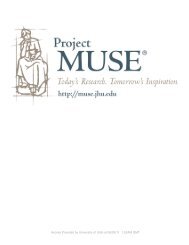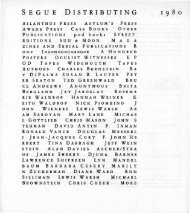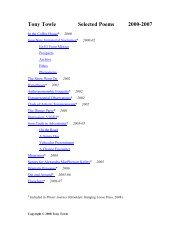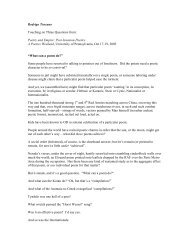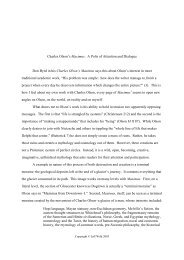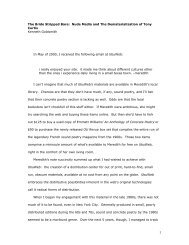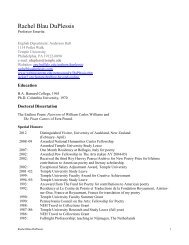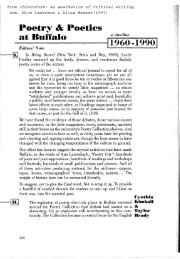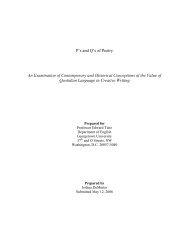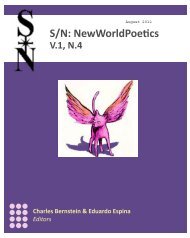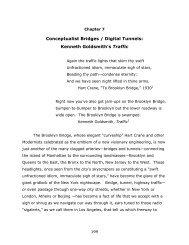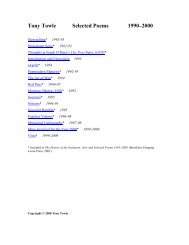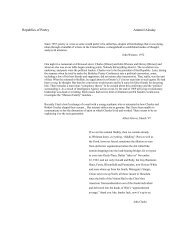Preface - Electronic Poetry Center
Preface - Electronic Poetry Center
Preface - Electronic Poetry Center
You also want an ePaper? Increase the reach of your titles
YUMPU automatically turns print PDFs into web optimized ePapers that Google loves.
From: Tom Mandel<br />
Subject: Re: Apex of the M<br />
I originally began this as a private message to Marjorie Perloff, to tell her she’d<br />
hit the nail on the head in her comments on the Apex intro, meaning to quote to<br />
her what Hobbes said of Spinoza – I durst not have spoke so freely (that’s a<br />
paraphrase, source not being handy), being a Language Poet myself (wch when<br />
it happened to me meant being in a loosely-(un)defined and altogether<br />
anonymous group of abt 15-20 folks but now means being in an altogether<br />
over-commented and literally undefinable crowd of ?3-500?), but have decided<br />
to make the comment openly, wanting to add one or two things…<br />
To go from the introduction of the Apex issue in question to the work gathered<br />
therein is an interesting study. Mostly what’s in the issue is the work of poets in<br />
mid-career, many of whom associated (i.e. are associated) with LP – how can<br />
this so-called manifesto claim them for a next or new way?<br />
I believe the editors must understand themselves to have chosen these poets in<br />
mid-career as illustrative of their (the editors’) sense of where poetry needs to<br />
go now, as illustrative of the ideas in the introduction. Thus, the making of<br />
manifestos (manifesti?) and new movements is reduced from that of actually<br />
creating a new poetry to being a thoughtful editor. The surrealists too had their<br />
chosen forebears to bring forward (i.e. Lautreamont), but they were rescuing<br />
work wch had been neglected and even rejected not putting together a table of<br />
contents wch cd as easily have been found in Temblor in the late 80’s<br />
(obviously, somewhat different) or O-blek in the earlier 90’s. Moreover, the<br />
relative proportion of forebears (a few) to active perpetrants of the<br />
revolutionary new poetry (a triple handful) seems more appropriate than in the<br />
case of Apex volume.<br />
Thus new tendencies in poetry as the acts of editors? Sorry, I don’t think so.<br />
It’s hard not to see in this volume a 2d chapter in a different town of the<br />
intentions of the editors of ACTS in SF who invented a term analytic lyric<br />
which they wished to counterpose to Language <strong>Poetry</strong>, then went around telling<br />
everybody that this was what they wrote. I remember asking Benjamin<br />
Hollander (along with David Levi Strauss, the editor of ACTS) what the term<br />
meant. Mostly, his answer was that it was what I was writing! (I and others, of<br />
course – I don’t mean they were vaunting me in particular) No thanks,<br />
Benjamin, I’m a language poet – i.e. my work, wherever it goes and whoever it<br />
attracts the attention of, is historically located in that tendency. If I write



